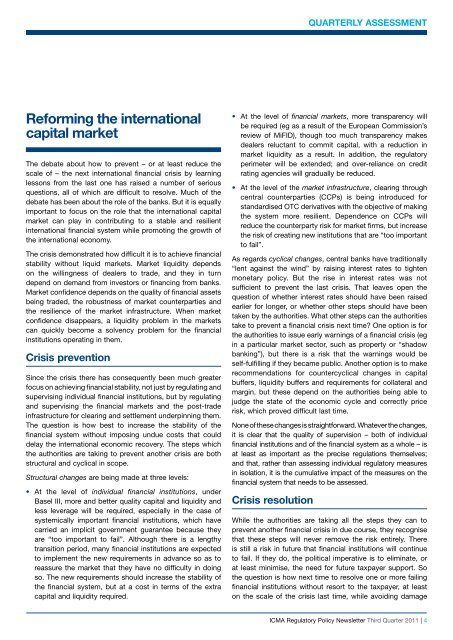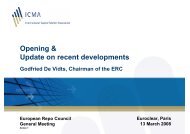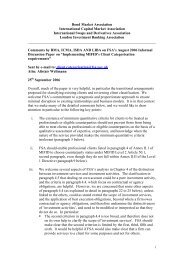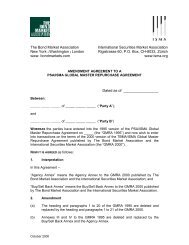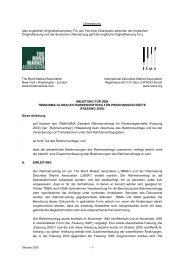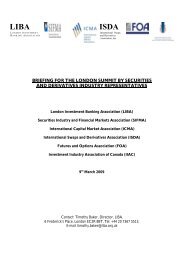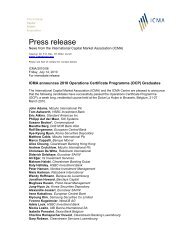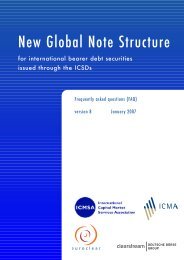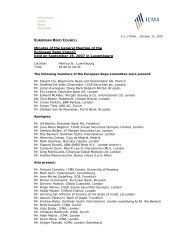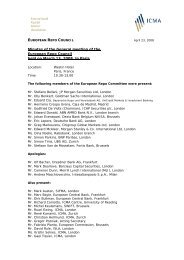Issue no. 22: ICMA Regulatory Policy Newsletter
Issue no. 22: ICMA Regulatory Policy Newsletter
Issue no. 22: ICMA Regulatory Policy Newsletter
Create successful ePaper yourself
Turn your PDF publications into a flip-book with our unique Google optimized e-Paper software.
Reforming the international<br />
capital market<br />
The debate about how to prevent – or at least reduce the<br />
scale of – the next international financial crisis by learning<br />
lessons from the last one has raised a number of serious<br />
questions, all of which are difficult to resolve. Much of the<br />
debate has been about the role of the banks. But it is equally<br />
important to focus on the role that the international capital<br />
market can play in contributing to a stable and resilient<br />
international financial system while promoting the growth of<br />
the international eco<strong>no</strong>my.<br />
The crisis demonstrated how difficult it is to achieve financial<br />
stability without liquid markets. Market liquidity depends<br />
on the willingness of dealers to trade, and they in turn<br />
depend on demand from investors or financing from banks.<br />
Market confidence depends on the quality of financial assets<br />
being traded, the robustness of market counterparties and<br />
the resilience of the market infrastructure. When market<br />
confidence disappears, a liquidity problem in the markets<br />
can quickly become a solvency problem for the financial<br />
institutions operating in them.<br />
Crisis prevention<br />
Since the crisis there has consequently been much greater<br />
focus on achieving financial stability, <strong>no</strong>t just by regulating and<br />
supervising individual financial institutions, but by regulating<br />
and supervising the financial markets and the post-trade<br />
infrastructure for clearing and settlement underpinning them.<br />
The question is how best to increase the stability of the<br />
financial system without imposing undue costs that could<br />
delay the international eco<strong>no</strong>mic recovery. The steps which<br />
the authorities are taking to prevent a<strong>no</strong>ther crisis are both<br />
structural and cyclical in scope.<br />
Structural changes are being made at three levels:<br />
• At the level of individual financial institutions, under<br />
Basel III, more and better quality capital and liquidity and<br />
less leverage will be required, especially in the case of<br />
systemically important financial institutions, which have<br />
carried an implicit government guarantee because they<br />
are “too important to fail”. Although there is a lengthy<br />
transition period, many financial institutions are expected<br />
to implement the new requirements in advance so as to<br />
reassure the market that they have <strong>no</strong> difficulty in doing<br />
so. The new requirements should increase the stability of<br />
the financial system, but at a cost in terms of the extra<br />
capital and liquidity required.<br />
QUARTERLY ASSESSMENT<br />
• At the level of financial markets, more transparency will<br />
be required (eg as a result of the European Commission’s<br />
review of MiFID), though too much transparency makes<br />
dealers reluctant to commit capital, with a reduction in<br />
market liquidity as a result. In addition, the regulatory<br />
perimeter will be extended; and over-reliance on credit<br />
rating agencies will gradually be reduced.<br />
• At the level of the market infrastructure, clearing through<br />
central counterparties (CCPs) is being introduced for<br />
standardised OTC derivatives with the objective of making<br />
the system more resilient. Dependence on CCPs will<br />
reduce the counterparty risk for market firms, but increase<br />
the risk of creating new institutions that are “too important<br />
to fail”.<br />
As regards cyclical changes, central banks have traditionally<br />
“lent against the wind” by raising interest rates to tighten<br />
monetary policy. But the rise in interest rates was <strong>no</strong>t<br />
sufficient to prevent the last crisis. That leaves open the<br />
question of whether interest rates should have been raised<br />
earlier for longer, or whether other steps should have been<br />
taken by the authorities. What other steps can the authorities<br />
take to prevent a financial crisis next time? One option is for<br />
the authorities to issue early warnings of a financial crisis (eg<br />
in a particular market sector, such as property or “shadow<br />
banking”), but there is a risk that the warnings would be<br />
self-fulfilling if they became public. A<strong>no</strong>ther option is to make<br />
recommendations for countercyclical changes in capital<br />
buffers, liquidity buffers and requirements for collateral and<br />
margin, but these depend on the authorities being able to<br />
judge the state of the eco<strong>no</strong>mic cycle and correctly price<br />
risk, which proved difficult last time.<br />
None of these changes is straightforward. Whatever the changes,<br />
it is clear that the quality of supervision – both of individual<br />
financial institutions and of the financial system as a whole – is<br />
at least as important as the precise regulations themselves;<br />
and that, rather than assessing individual regulatory measures<br />
in isolation, it is the cumulative impact of the measures on the<br />
financial system that needs to be assessed.<br />
Crisis resolution<br />
While the authorities are taking all the steps they can to<br />
prevent a<strong>no</strong>ther financial crisis in due course, they recognise<br />
that these steps will never remove the risk entirely. There<br />
is still a risk in future that financial institutions will continue<br />
to fail. If they do, the political imperative is to eliminate, or<br />
at least minimise, the need for future taxpayer support. So<br />
the question is how next time to resolve one or more failing<br />
financial institutions without resort to the taxpayer, at least<br />
on the scale of the crisis last time, while avoiding damage<br />
<strong>ICMA</strong> <strong>Regulatory</strong> <strong>Policy</strong> <strong>Newsletter</strong> Third Quarter 2011 | 4


